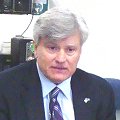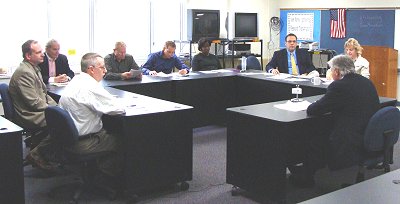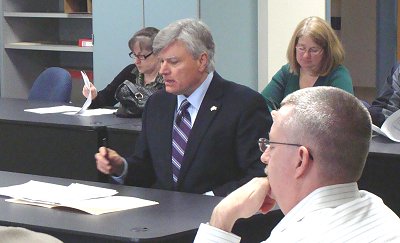- By Dan Veaner
- News
 Print
Print 
NY Senator Michael Nozzolio
"We try to be sensitive to the taxpayers, but at the same time keep our educational program, of which we're very proud, moving forward," said School Superintendent Stephen Grimm. "We thought we were being able to avert some of the outside pressures that some of the other school districts have had."
 The Lansing Board of Education met with State Senator Michael Nozzolio at the Lansing/Groton Teacher Center Saturday Clockwise from end of left table: School Board members Michael Cheatham, Glenn Swanson, Richard thaler, David Dittman, Glenn Cobb, Aziza Benson, Superintendent Stephen Grimm, Anne Drake, Senator Michael Nozzolio |
Nozzolio was highly critical of the state budget, saying it is influenced by downstate policy makers to the detriment of upstate. He said that an unwritten rule that allocated a third each of state education aid to suburban areas, to urban areas in the downstate area, and to upstate was broken last year at the expense of upstate.
"It's a terrible budget," he said. "It's the worst budget we've had ever. It had 10% increase in state spending, a horrendous series of taxes including energy taxes which we'll all pay, health insurance cost taxes -- every aspect of life in New York had a tax increase. A 30% increase in the income tax. Anyone with any kind of income whatsoever should leave this state because they are being grossly overtaxed."
"In the recent history of the State of New York we have not had an appointed governor in a lame duck situation," Nozzolio continued. "We have not had a fiscal crisis to the degree that we are experiencing today. We have not seen in the history of our state three leaders in Albany who are from and living in the City of New York. There is tension anyway between our upstate interests and downstate policy makers. That is part of the process, but this year it's exacerbated by having the legislative leaders from the Senate, from the Assembly, and the Governor from New York City."
BOE members and Nozzolio alike were critical of unfunded mandates. Nozzolio noted that both the state and federal governments require onerous and costly procedures that school districts are struggling to comply with at local taxpayer expense.
"The State has been a notorious culprit in the establishment of unfunded mandates. Some are good, some are not so good. All are costly," Nozzolio said. "The biggest unfunded mandate you have is the failure of the federal government to comply with its own law that says that federal monies for special education should reach 40% of the total special education budget. The federal government has never come up to the 40% level. In most cases it has been far less than the 40%. They just came up to half of the 40% this year."
Nozzolio said that Governor David Patterson slammed school districts, saying that now is the time to use up their reserves. But Grimm noted that even with judicial spending of school reserves, they will be gone within a few years. Grimm said that in the face of the economic disaster that schools will have to make fundamental changes to the way they deliver education. He said that five months is not enough time to make such drastic changes, and unveiled a plan to spend more of the reserves than originally anticipated in the upcoming budget to buy another year to come up with a plan.
"When we analyze the cuts and get above $400,000 we are thinking this is going to make a fundamental change in how we are delivering education," Grimm said. "We need more than five months to plan this out. We would take more out of reserves to buy another eleven months. We are basically done after one year. We would turn a financially healthy district upside down in only two years."
"We're looking at tactical ways to slow down the bleeding," added school board member Glenn Cobb. "But what's going to happen in three or four years when we've bled out all of our reserves? What is the state going to do to relieve these problems?"
Other impacts on school spending were also discussed. BOE member David Dittman asked Nozzolio why school districts that are working well are penalized by having to pay charter school tuition. He suggested an alternate approach in which failing systems would pay more than those that are doing well. BOE member Michael Cheatham asked for relief from the 'Triborough Amendment,' which puts school boards at a severe disadvantage when negotiating contracts with teacher unions.
"School boards are at a disadvantage because of the Triborough Amendment, which gives unions no incentive to negotiate because salary increases continue even after a contract has expired," Cheatham said. "School boards need help."

Nozzolio asked both board members to follow up with specific suggestions for implementing their ideas. He also floated the idea of changing the way the Department of Education is organized, and especially the way in which the Regents are appointed. He asked whether anyone in the room knew which Regent represents them: nobody did. He said that is an example of how the system has broken down, asking how that Regent can represent school districts that he or she never visits or communicates with.
"To me the Department of Education is too insulated from the types of managerial challenges that other agencies have to comply with," he said. "There is some history of having the Regents selected by the Legislature. That was at a time when every county had at least one assembly person and Senate districts were no more than four counties large."
"We know who you are," said BOE President Anne Drake. "We just want to know how much money you're going to give us and when."
"If it was up to me it would be immediately and you would have what you had last year. But I can't say that's the case," Nozzolio replied. "We're at a tremendous turning point. If the state continues to tax and not cut spending and not cut those programs that are growing 75% we will not recover. Right now we are almost guaranteed to be the last state out of the recession because of the policies that were established last year."
----
v6i11



